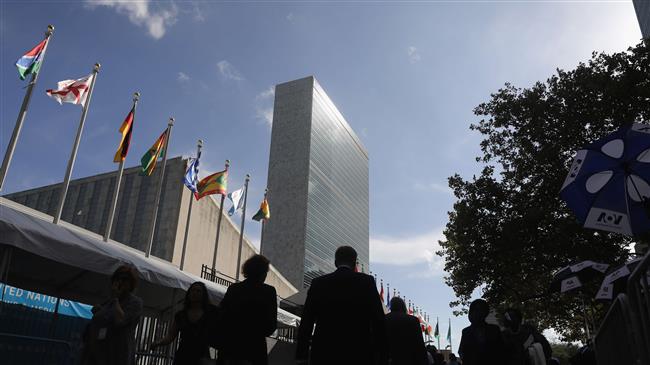Russia submits draft resolution to UN to preserve treaty with US
Russia says it has submitted a draft resolution to the United Nations General Assembly to preserve the Intermediate-Range Nuclear Forces (INF) Treaty with the United States, following a US decision to unilaterally withdraw from the Cold War-era nuclear arms agreement.
Fyodor Strzhizhovsky, a spokesman for the Russian Permanent Mission to the UN, made the announcement on Saturday.
“The unilateral actions by the US on effectively initiating a procedure of ‘suspending’ their participation in the Treaty, a step not envisaged in this Agreement, put the future of the INF Treaty in jeopardy,” Strzhizhovsky said in a statement.
“In this regard, the Russian Federation submitted to the UN General Assembly on December 14 a draft resolution in support of preserving and observing the INF Treaty that calls on all sides to fulfill their obligations in the framework of this Treaty and resolve issues pertaining to fulfilling the assumed commitments,” he added.
The diplomat also said that “the Russian Federation assigns great importance to preserving the INF Treaty, the cancellation of which may seriously undermine international mechanisms in the sphere of non-proliferation of weapons of mass destruction and sphere of arms control.”
The INF was signed in 1986 between then US President Ronald Reagan and Soviet Union President Mikhail Gorbachev. It banned all land-based missiles with ranges of 310 to 3,420 miles and included missiles carrying both nuclear and conventional warheads. The original ban between Moscow and Washington led to the elimination of 2,692 missiles.
US President Donald Trump said on October 20 that Washington would withdraw from the INF, over claims that Moscow had violated the pact.
Trump’s decision drew criticism from Russia, China, and US allies, who have warned against the security risks the collapse of the INF could pose to Europe.
Russian President Vladimir Putin warned last week that Moscow would be forced to respond if Washington withdrew from the nuclear arms control treaty.
Earlier this month, US Secretary of State Mike Pompeo said that Washington would suspend its obligations under the INF in 60 days unless Russia returns to what he said is full compliance with the agreement. Russia has repeatedly denied that it has violated the decades-old treaty.
Moscow has on several occasions expressed readiness for an open and detailed negotiation with Washington to discuss disagreements concerning the landmark treaty, but the Russian Defense Ministry says it has not received any response from the US.
The lack of response has been viewed by officials in the Kremlin as the US reluctance to maintain professional dialog with Russia to solve pressing regional and global security issues.
‘All wars have rules. All of those rules have been broken’ by Israel
VIDEO | Report flags India’s violation of rights of Rohingya detainees
Turkey's foreign minister meets Syria's de facto leader in Damascus
'Next to impossible' to rescue patients from Gaza's Kamal Adwan Hospital: Director
VIDEO | Vietnam current prosperity
Report blames gasoil exports for shortage at Iranian power plants
VIDEO | Hind Rajab Foundation names Israeli war criminals vacationing after Gaza genocide
VIDEO | Australians rally for Gaza ahead of Christmas festivities











 This makes it easy to access the Press TV website
This makes it easy to access the Press TV website